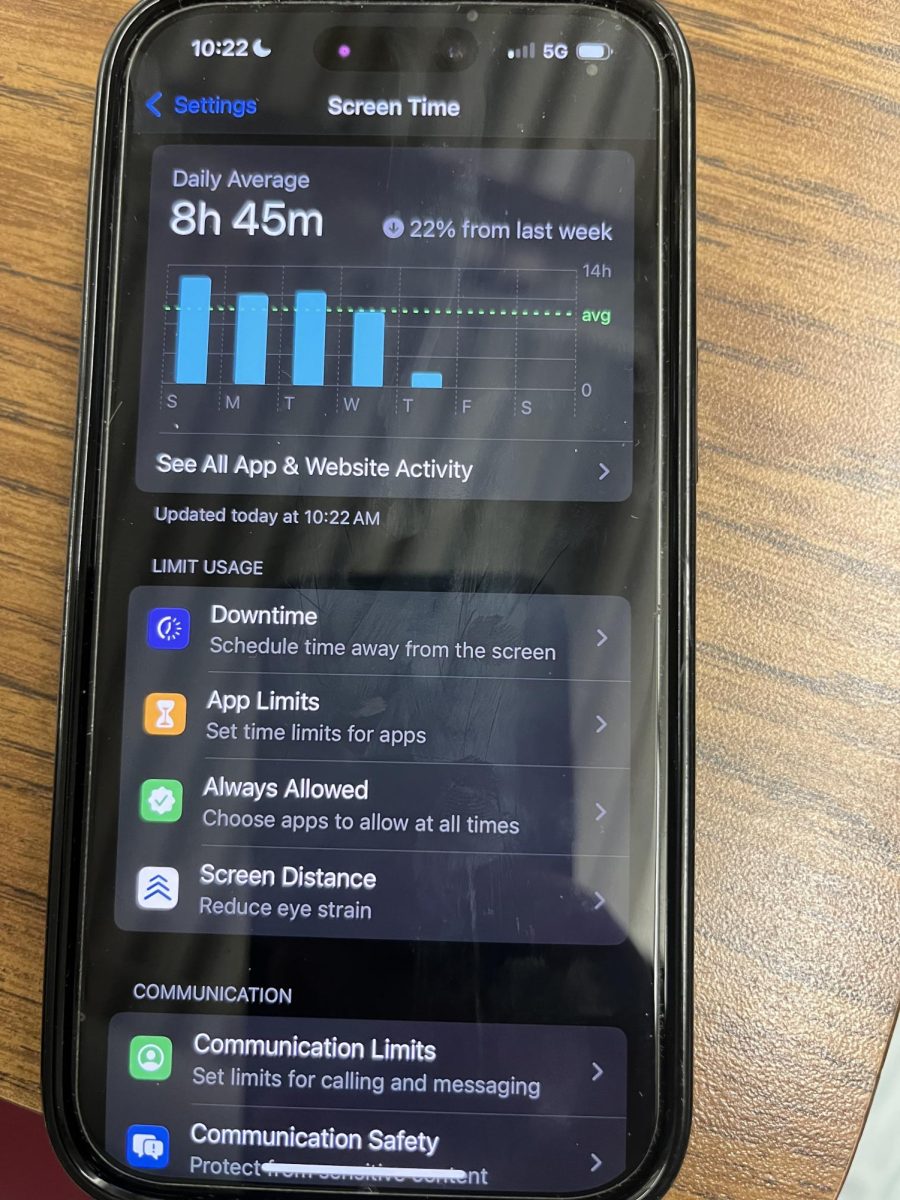We all have a New Year’s resolution, it’s something that we all do when the ball drops in hopes of achieving something in the New Year. Realistically, none of us ever achieve all of our resolutions. There are two types of people when it comes to resolutions: the ones who don’t try to reach their resolutions but make them because it’s what everyone else does, and those who motivate themselves to reach their resolutions knowing that it will benefit them. Yet somehow, no one seems to ever reach the one goal that is on everyone’s list: spending less time on phones.
For the first week of January, everyone is scrambling to stick to their goal. This typically dies down after people realize how unrealistic their goal is. Not many have the motivation to stick with their goals, but those who do really benefit. The one goal that seems to stump many is spending less time on their phones. According to demandsage.com people in America spend around 7 hours or more of screen time in 2024 on average. Though many may think that that is large compared to 10 years ago, it really isn’t. Back in 2014, the average screen time was about 6 and a half hours according to backlinko.com. So the problem isn’t that people set the bar too high because with enough effort, having less screen time is reachable. But what is the problem?
We all remember that day in 2020 that changed our lives forever: COVID-19. This pandemic put the whole world on pause when it spread like wildfire and infected billions of people. Schools all over the world closed, jobs were put on hold, and many were left unemployed. Well, during that time when people were caged in their homes, phones were the thing that people looked to when they needed to be entertained. Now, people are making a living just by uploading videos to the internet and many spend mindless hours scrolling through social media in their boredom. Another factor was that schools began teaching online classes, causing students to spend more time on the screen. COVID-19 played a huge role in the reason for rising screen time, because of COVID, electronics have become part of our routine and turned into a habit. People are now addicted to electronics, which causes many things in our brains to occur.
As soon as someone hears their phone go off, they are immediately going to check what it is and who it’s from. It’s become a sort of impulse. This is because people are addicted to their phones. In an article written by piedmont.org, Dennis Buttimer, a life and wellness coach at Thomas F. Chapman Family Cancer Wellness at Piedmont, stated, “Both the content on your phone and the act of checking it frequently can trigger a stress response, which releases cortisol into the body.“ Not only do phones cause stress in people, but as Buttimer also mentioned in the article, constant checking of phones releases a hormone called dopamine. “When we check our phones, our brains release a small amount of dopamine. Dopamine motivates us to take action and each time we hear a notification, we check our device. The problem is this dopamine boost is temporary and leads to a letdown. Our brains want more dopamine, which triggers the habit of checking our phones constantly throughout the day.”
This is what causes phones to be so addictive. Fortunately, there is hope for those who wish to spend less time on their electronics.
An article written by Scripps Health gave eight ways to help reduce the amount of time people spend on their phones. One of the tips was to keep track of your screen time. According to the article, smartphones have a feature that allows you to check your daily and weekly screen time averages. Another way to keep track of your screen time could be to set alarms that remind you that you need to get up and move. The only problem that this brings is procrastination.
Procrastinating is something that people these days do best. Especially when it comes to putting their phones down. Setting an alarm can be helpful, but when procrastination kicks in, people tend to stop the alarm and scroll aimlessly. Procrastination can be prevented in many ways. Boise State University published an article stating ways to do so. According to the article, minimize decisions, plan your days ahead of time, give yourself an ultimatum, focus on something doable, and adjust your environment. Procrastination is one of the biggest reasons for too much screen time. These tips will help reduce screen time greatly.
While New Year’s resolutions seem to be unrealistic, there are many ways to achieve them. Our minds are capable of many things, we just have to have them in the right place.






















